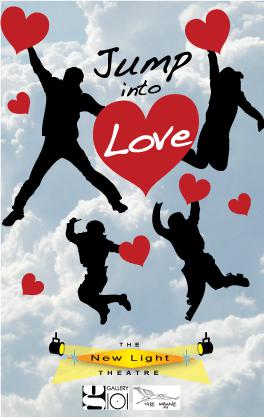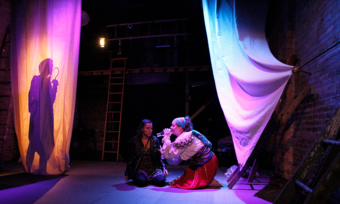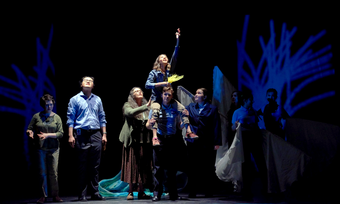The Paradox of Devised Theater on the Twenty-First Century Stage
For about a year now, my theatre company, The Krane, has been working on a piece of devised theatre called The Underground. During this period, we have, appropriately, been living in a kind of metaphoric underground bunker of ideas wherein what we are doing, in essence, is building a ladder to the surface of the contemporary stage. This ladder to the surface is complex. Our intent is that, once we come out from our den of creativity, we are able to reach a broad audience, while, at the same time, remaining true to the “underground” nature of the form.
To start—a definition. By now, most people in the theatre world know what devised theatre is. But, just in case, devised theatre is theatre that begins without a script. The script gets “written” as the rehearsal process takes place through a series of improvisations and collaborations. And what results is, in my mind, the multifaceted and omnivorous child of both the Internet and age-old traditional forms like Commedia dell’arte—both fluid and pastiche.
The script gets “written” as the rehearsal process takes place through a series of improvisations and collaborations.

In our case, before we got on our feet with our project, we started at the table with a group of ideas and a book. Our ideas: What does it mean to make art in the twenty-first century? Where does art incubate today? Is there an “underground” anymore, or is it—for good or bad—all “surface?” What is surface? What is underground? These are the questions we have been trying to take apart and translate into performance itself. As for the book we started with: Jennifer Egan’s, A Visit from the Goon Squad.
I want to dwell on Egan’s book a bit (just as we did in our rehearsals), particularly a chapter called “Goodbye, My Love” because I believe that the ideas inherent in this chapter are extremely relevant to what devised theatre means for art and theatre today.
In “Goodbye, My Love,” a character, Ted, is looking for his “lost” niece, Sasha, in Naples, Italy, although at times it seems like Ted's priority is more about looking at and thinking about art than searching for his niece. One day, he slips into the halls of the Museo Nazionale, longing for a peek at a marble relief of Orpheus and Eurydice. As Ted approaches the sculpture, his heart “fibrillates” in his chest, trying to punch through the surface of his body, something the sculpture itself is doing, as the figures of Eurydice and Orpheus emerge from the flat marble surface.
In this chapter, we’re asked to pay very close attention to surface, including the surface of art. We’re told that surface is something you can permeate. And then we’re asked to consider Greek mythology and music. All of this while Ted searches for Sasha, who is the character that as the kleptomaniac ex-assistant of the music producer Bennie Salazar opens the book. Sasha has meandered around the world, attempted suicide (another form of going beneath the surface and to expose the deeper vein), found and lost herself in music and musicians, and who, ultimately, by the novel’s end, is the novel’s self-proclaimed “survivor,” living where the light is brightest, out in the middle of the desert.
The scene referenced above, with Ted in the museum, comes while Sasha is marooned in Naples, estranged from her family—her family has asked Ted to go find her, and Ted, who knows Sasha from her childhood, and has always wanted to save her, is perfect for the job. He is also, just as importantly, someone who is an expert at surfaces. He’s an art historian who doesn’t have much time to think and write about art anymore, but whose doctoral dissertation was about the way in which Cezanne’s brushstrokes were really about music; “an effort to represent sound.” He is also a father, whose sons play so many sports (football, fencing, wrestling, tennis, skateboarding, golf, soccer, ping-pong, etc) that “at times it seemed to Ted that his sons took up sports merely to ensure his presence beside the greatest possible array of playing surfaces” [italics mine]. It is, in fact, surface that leads him to Sasha, and the thing that allows him to “recover” her. He finds Sasha right after being taken in by the marble relief of Orpheus and Eurydice, which is significant, considering not only the materiality of the sculpture, but the story behind it.
In the story of Orpheus and Eurydice, Orpheus is a spectacular musician, able to work magic with his lyre, the son of Apollo, god of music (and also the god of the sun). In any case, Orpheus falls madly in love with Eurydice and they marry. One day, however, Eurydice, while frolicking with Orpheus in a meadow, gets bit by a snake and dies, going immediately to the underworld. Hades (in the Greek version), keeper of the underworld, is so charmed by Orpheus’s music, that he allows him “underground” to play his music and pull his wife out. The thing is, Orpheus can’t look back as they, husband and wife, rise to the surface. What does Orpheus do? He looks back and all is lost.
The marble relief Ted is looking at in the museum in Naples is Orpheus and Eurydice’s last moment together, their goodbye—Orpheus had been allowed back into the underworld for this goodbye and this is their final touch. It’s easy to see the connections here. Ted is about to pull Sasha out of the “underground” world she’s been living in, which is, perhaps ironically, filled with music. Sasha will later want to learn to play the harp (plucked just like the lyre). The twist is that, here, Ted is able to “save” Sasha not because he can play his magic lyre, but because he is able to read music through art (sculpture in this case); he is able to get under its surface—able to fold himself into art. But, and this is key, he is also capable of releasing himself from art’s grip; resurfacing after being submerged in it.
And here, I believe, is where devised theatre comes in. In a sense, we are using a self-reflexive medium by discussing “the underground” through devised theatre. In our case, as we make a show about “the underground.” For, devised theatre is a theatre made up of the essence of art—collaboration and process—a deep, underground process that participants must enfold themselves in, like Ted from Goon Squad, but also be capable of bringing to the surface of the “stage,” also like Ted. Here, we have a form that is often considered more about process than about product; a form that incubates and lives most of its life underground—often the process of creation extending for much longer periods of time than the life of the performance. It lives underground and then surfaces, and, as it surfaces, it reinstates the underground. Illustrating process.
And here, I believe, is where devised theatre comes in. In a sense, we are using a self-reflexive medium by discussing “the underground” through devised theatre.
For a long time, devised theatre has lived on the fringes, in large part due to lack of funding. It takes time to create a devised product, and this kind of time and patience is antithetical to the quick flash of Googleized seconds we live in, and yet, in another paradox, the form itself makes sense in this self-same Googleized world because of its hybridity, it’s ability to straddle varying media. And, for this reason, in an interesting twist, devised theatre has become more and more popular. Groups all over the world are finding this to be true. Groups such as Ghost Road in Los Angeles and The Paper Birds in the United Kingdom; theatres across Chicago as well, are all devising theatre and pushing it forward into the mainstream.
On the one hand, one wonders sometimes, whether bringing this kind of theatre into the mainstream isn’t a contradiction, whether it will eventually “water down” the process, as houses beg for cheaper production costs, and shorter rehearsal periods. And, yet, on the other hand, I have to ask whether it isn’t entirely appropriate to bring devised theatre into the mainstream. Technology, which so often aids and abets devised theatre, is trying to obliterate surface, after all. Our computers are getting thinner and thinner, inching towards a kind of space where there will be no surface, only a digital projection in air. And so, how do we make art in a world that seems obsessed with surface—a surface that is, technologically, and, ironically, about to disappear? The answer for theatre, I believe, lies in devised theatre—an art form that plays upon multiple surfaces in flux (the human body for one), and multimedia—all in order to reinstate a kind of underground. In a world in which surface is fetishized, devised theatre tells the viewer, now you see surface, now you don’t, playing with the appearance and disappearance of said surface and echoing back, always, towards something deeper.
The paradox, then, of devised theatre into the mainstream is that the production is a mirroring of the kind of tunneling upwards and play upon surface that our social fabric, as a whole, is currently facing. The kind that Orpheus attempts and fails, but that Ted manages to teach to Sasha in Goon Squad. Devised theatre is, therefore, both a reinstatement of the underground, and an absolute embrace of the surface. It is both surface and underground—it is the hyphen between the two, the bridge. Or better yet, the “technology,” so to speak, that allows surface to disappear. Art such as this is both the mirage and sustenance in Sasha’s desert; the ground we come up from under in order to breathe and feed. Now you see it, now you don’t.












Comments
The article is just the start of the conversation—we want to know what you think about this subject, too! HowlRound is a space for knowledge-sharing, and we welcome spirited, thoughtful, and on-topic dialogue. Find our full comments policy here
We are told here that a devised work is "written" by the group. But this describes a group-written play--not devised theater. One of the key values of devised theater is that it bypasses the literary, constructing itself out of sensation rather than logic. If one is working with such intellectual and literary material as is described here why not just write a play? If the group is working so hard at creating a script, can the piece truly be said to be devised theater? In devised theater isn't the script one of the last things thrown together? And only then because the board ops need something to keep track of where they are in the show.
Many of the assumptions made make me think that the author is unfamiliar with the broad scope of devised performance and what distinguishes it from script-based theater. For example it is said that devised theater somehow benefits from technology and uses multimedia. But surely this was not true of the great works of The Open Theater, The Performance Group, and Theatre Workshop. Even contemporary masters like Frantic Assembly and Goat Island are not building their work on technology but rather on the bodies, and experimentation of its performers--performers incidentally who are not substituting for playwrights, but rather creating work in which writing is only one minor element among others.
There is an exhaustive recounting of a portion of a novel. Then this novel is somehow cited as giving insight into devised theater. That seems a leap. Perhaps more space should have been given to clarifying sentences such as "Technology, which so often aids and abets devised theater, is trying to obliterate surface, after all." It is an assertion that does not have to be justified because any meaning evaporates upon examination. It seems like so much in this piece designed to obscure rather than clarify.
(And what does it mean to be both "fluid and pastiche?")
I absolutely understand the concerns here re: the playwright. I am a playwright myself and know what that means, perched on this new century, as Owa states so nicely. I am not saying Devised Theater is the ONLY way...in fact I am, at the same time, working on two other projects that follow a more "traditional" vein (and I do use that word with caution). What I am saying, however, is that devised theater is particularly important right now. I think Ben points to some of those reasons, as does the article. I do, also, think that the playwright has a very strong role in devised theater (beginning without a script does not mean beginning without a playwright) -- as in so many other areas (like gender and marriage and etc), roles are becoming more and more fluid. This makes us question our identity but it does not erase us -- not at all. It, in fact, I believe, so often makes us stronger.
I'm so happy that this piece was written, as it gives me a voyeuristic thrill seeing how another company is working and thinking. Thank you for that Vanessa.
As Joe notes, I too am concerned by the definition of devised theater here, and also by the idea that "by now most people in the theater world know what devised theater is." The definition of devised work as not having a playwright doesn't hold up, as many of us are, or become, writers over time. Not starting from a finished script is a critical and common element, but by no means the only one.
For a decade my company, foolsFURY, has been producing the FURY Factory, a festival of ensemble created theater in San Francisco. Most of the productions we've presented (nearly 100) would fall into some definition of "devised," but the approaches differ wildly - things written by a group, adaptations of existing works, movement pieces without text, frameworks that are set up for audience participation, etc.
The radical acts in all of this, it seems to me, are twofold. First is the granting of time for the process, as Vanessa points out clearly. These processes take much longer creation periods than go into the production of an existing script (although not necessarily longer than the time from a playwright beginning a new play to opening night!). And in a results-oriented culture where time is expensive, the decision to spend significant time of an artistic project (usually time that will not result in greater ticket sales), is a defiant gesture, possible only when the process is valued as much as the product.
The other critical aspect of an ensemble theater (and generally speaking, devised theater) approach is the empowering of collaborators to be generative artists as well as interpretive ones. In this way ensemble work is an anecdote to massively disempowering nature of the dominant audition/rehearsal/production model.
I'm a little concerned by the oversimplification of the definition of "devised theatre." I think it's infinitely more complicated than simply not having a script to start. There's a philosophy around creating a devised work that also should inform the definition. Additionally, I think we need to consider what we mean by "mainstream." I would venture to say that devising happens in more processes than we think, but people are reluctant to use the term.
As a struggling playwright and which of among us are not struggling playwrights---The term "underground" conjures up the most irrational fears in the human mind. Add the paradigm of "devised" (meaning in this case "no script"---which could be interpreted as no playwright) and the specter becomes Behemoth. Over intellectualized of dramatic nomenclature has always been the bane of dramatic vision and arts productions . Grotowski tried to usher in a "Poor Theater"eschewing the playwright--history has demonstrated what happened to him. Yet the spectra of the Underground still haunts humanities urging for self-improvement. America was once an underground movement, bursting forth as one of the leaders of a new political ideal--"all men created equal"--now America is the chief above ground instigator of .reactionary and counter-revolutionary politics, that some are more equal than others.... How ironic, that underground movements become. above ground pains--usually accompanied by "enhanced interrogation" methodologies.
Theater is nothing if not experimental. In this wise, ideas come and grow or go... Here we find ourselves, at the end of a century, perched at the rise of a new millennium which suggests, any and every thing is up for grabs. Underground can be a favorite starting point for such explorations into the dramatic psyche of the universal mindset. There is a caveat however---proceed at your own risk...